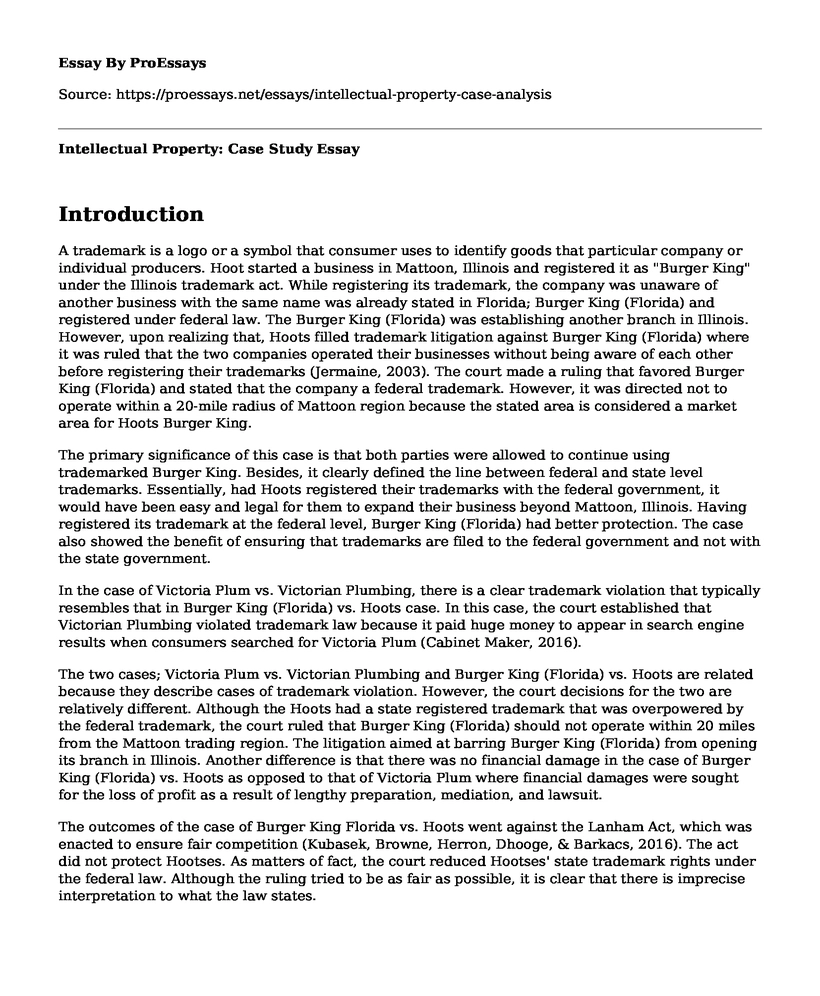Introduction
A trademark is a logo or a symbol that consumer uses to identify goods that particular company or individual producers. Hoot started a business in Mattoon, Illinois and registered it as "Burger King" under the Illinois trademark act. While registering its trademark, the company was unaware of another business with the same name was already stated in Florida; Burger King (Florida) and registered under federal law. The Burger King (Florida) was establishing another branch in Illinois. However, upon realizing that, Hoots filled trademark litigation against Burger King (Florida) where it was ruled that the two companies operated their businesses without being aware of each other before registering their trademarks (Jermaine, 2003). The court made a ruling that favored Burger King (Florida) and stated that the company a federal trademark. However, it was directed not to operate within a 20-mile radius of Mattoon region because the stated area is considered a market area for Hoots Burger King.
The primary significance of this case is that both parties were allowed to continue using trademarked Burger King. Besides, it clearly defined the line between federal and state level trademarks. Essentially, had Hoots registered their trademarks with the federal government, it would have been easy and legal for them to expand their business beyond Mattoon, Illinois. Having registered its trademark at the federal level, Burger King (Florida) had better protection. The case also showed the benefit of ensuring that trademarks are filed to the federal government and not with the state government.
In the case of Victoria Plum vs. Victorian Plumbing, there is a clear trademark violation that typically resembles that in Burger King (Florida) vs. Hoots case. In this case, the court established that Victorian Plumbing violated trademark law because it paid huge money to appear in search engine results when consumers searched for Victoria Plum (Cabinet Maker, 2016).
The two cases; Victoria Plum vs. Victorian Plumbing and Burger King (Florida) vs. Hoots are related because they describe cases of trademark violation. However, the court decisions for the two are relatively different. Although the Hoots had a state registered trademark that was overpowered by the federal trademark, the court ruled that Burger King (Florida) should not operate within 20 miles from the Mattoon trading region. The litigation aimed at barring Burger King (Florida) from opening its branch in Illinois. Another difference is that there was no financial damage in the case of Burger King (Florida) vs. Hoots as opposed to that of Victoria Plum where financial damages were sought for the loss of profit as a result of lengthy preparation, mediation, and lawsuit.
The outcomes of the case of Burger King Florida vs. Hoots went against the Lanham Act, which was enacted to ensure fair competition (Kubasek, Browne, Herron, Dhooge, & Barkacs, 2016). The act did not protect Hootses. As matters of fact, the court reduced Hootses' state trademark rights under the federal law. Although the ruling tried to be as fair as possible, it is clear that there is imprecise interpretation to what the law states.
Conclusion
In conclusion, when starting a new enterprise, particularly in the food industry, one should understand the essential intellectual property rights crucial. In particular, he or she should conduct a comprehensive and professional search of all the necessary trademarks related to the business before investing in them. Undoubtedly, had any of the companies done this in advance before registering their businesses, they could have avoided costly lawsuits that came as a result of trademark violations.
References
Cabinet Maker. 2016, November 24). VictoriaPlum seeks 'substantial? Compensation following ruling; Victorian Plumbing could appeal. Retrieved January 18, 2019
Jermaine, J. (2003, November 20). The burger king and queen of Mattoon. Retrieved January 18, 2019
Kubasek, N., Browne, M. N., Herron, D. J., Dhooge, L. J., & Barkacs, L. (2016). Dynamic business law: The essentials (3rd ed.). New York, NY: McGraw-Hill Education.
Cite this page
Intellectual Property: Case Study. (2022, Feb 12). Retrieved from https://proessays.net/essays/intellectual-property-case-analysis
If you are the original author of this essay and no longer wish to have it published on the ProEssays website, please click below to request its removal:
- Paper Example on Current Statistical Trends in Juvenile Crime
- Research Paper on Al-Qaeda
- Alternatives to Imprisonment: Solutions to Overcrowding in Jails and Prisons - Essay Sample
- Different Types of Punishment: Solitary Confinement, Torture and Panoptic Surveillance - Essay Sample
- Born a Crime - Literary Analysis Essay
- Espinoza v. Montana Department of Revenue Case Study
- Essay Sample on Asset Forfeiture: Confiscating Illegally Acquired Properties







